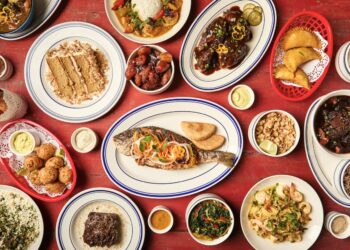Michelin starred Swedish chef, Stefan Karlsson, visited the newly-refurbished White Orchid Restaurant in Dubai last month to cook a special one-night only seven course menu, and Catering News ME was privileged to be invited to meet the master.
Last month Michelin Star Chef, Stefan Karlsson joined the team at the newly re-vamped White Orchid Restaurant at Jebel Ali Golf Resort, in Dubai, to prepare an appetising seven course meal, combining his Swedish heritage with the venue’s existing Asian-fusion concept.
 Hailing from Sweden, Chef Stefan prides himself on working with fresh and local produce to prepare heritage dishes with a modern and simple flare. It was this beautiful concept, nurtured in the traditional Swedish restaurants called Toso and SK Mat och Människor he runs in Gothenburg, which he brought with him to Dubai last month.
Hailing from Sweden, Chef Stefan prides himself on working with fresh and local produce to prepare heritage dishes with a modern and simple flare. It was this beautiful concept, nurtured in the traditional Swedish restaurants called Toso and SK Mat och Människor he runs in Gothenburg, which he brought with him to Dubai last month.
Fredrik Reinisch , general manager of Jebel Ali Golf Resort, said: “This was truly a fantastic experience to bring to Dubai and of great interest to the gastronomic residents of the city. It was a true honour to welcome Chef Stefan to our White Orchid restaurant and we look forward to having him back in the near future.
“Due to the popularity of the event we hope to welcome other known chefs from around the world in order to offer our guests the chance to experience trends and flavours otherwise not found in Dubai.”
Stefan Karlsson began his extensive career at the young age of 14 years in the South of Sweden. He says: “I’ve always had a great interest in food and raw materials and as a young lad I wanted to be a farmer. Fishing and cultivating one’s own raw materials were part of my childhood. I began in the kitchen for the first time when I was 13 as a practical period in school and afterwards I continued to work extra on weekends and during my holidays.”
It was that passion and inert ability that gifted him the ‘Rising Young Chef in Sweden’ award just a few years later. Chef Stefan regales with delight: “When I was 17 I completed my hotel and restaurant training and in the same year I won the Milda Stipendium, a competition for future promising chefs, equivalent to today’s Chef of the Year in Sweden.
“I was one of four young chefs considered to be promising and this resulted in much media attention. I also got to go on a food trip for inspiration and to meet well-known figures in the business.”
Over the last 20 years, he has efficiently stepped up the ladder and is today popularly known and loved in Sweden and even received the ‘Chef of the Year’. He has received several accolades and also had the opportunity to cater for the Nobel Prize for five years.
Today, Stefan is proud of many worthwhile achievements including a Michelin star, country representation, and cooking for royal events and Noble Peace Prize dinners, all the while remaining true to his routes and heritage.
Chef Stefan adds: “I love the Swedish cuisine, the Swedish food traditions and the local raw materials. I develop my Swedish taste heritage by combining it with other influences together with modern techniques.
“I would describe my style of food as urban. Swedish combined with what I experience and am inspired by. I stand for down-to-earth Swedish cooking with both feet firmly on the ground. I suppose I’m a modernist, but very well acquainted with European cooking traditions.”
“I cook traditional Swedish food and I want to pass on my taste heritage to my family. At home I cook traditional home cooked food such as Swedish hamburgers, collops and veal with dill. Dishes that my mother and grandmother cooked have had great influence on me; in those days they were housewives and cooked everything from the ground up. When potatoes were firm enough, they made potato dumplings with a filling of onions or meat, and they grew berries so that they could make their own fruit juice.
“My favourite restaurant dishes to cook depend on the season, but as a restaurateur on the West Coast of Sweden it’s always something from the sea, such as fish and shellfish.”
When it comes to ingredient sourcing, Chef Stefan believes that seasonal and local go hand in hand. “We follow the local seasons. In Sweden, the seasons are clearly defined and very short; strawberries, for example, are available for only three weeks. Everything grows more slowly here, everything ripens slowly, which means that the raw materials also have much more taste and are of higher quality.” This is in stark contrast to the Middle East, where very little grows, but most things are available all year round, despite the season, from all four corners of the globe.
Chef Stefan adds: “The UAE is a food culture that’s open to everything, and everything is available there. What is possibly missing is food with a Swedish undertone in combination with another culture, for example, Asian. During my visit in Dubai, we presented, among other things, tastes from a Swedish crayfish party, which included beer and dill. One of the things we prepared was a dumpling with lobster.”
While in Dubai Chef Stefan prepared an exceptional seven-course set menu, paired with five different wines throughout the evening, encouraging foodies to find their perfect pairing. However, seven courses could be considered a mere snack in comparison to some of the banquets he has prepared in the past; on several occasions for the royal family.
Chef Stefan elaborates: “The royal family is, just like me, proud to be Swedish and I’m more than happy to emphasise the Swedish food from the region I come from. They like Swedish food so it’s easy to please them.
“To date, I’ve prepared five Nobel banquets, and in the case of our Swedish royalty, I’ve participated in both Crown Princess Viktoria’s weddings, where I cooked the food for the reception the day before, and then at the City of Gothenburg’s banquet, which was a wedding gift to the couple and was held at Vinga Lighthouse.
“I also cooked for Princess Madeleine’s wedding reception and I’ve met Prince Carl-Philip in conjunction with Bocuse d’Or. I cooked the King’s dinner during his traditional Eriksgata journey to the region when we, among other things, made a churned butter that the King became very fond of. It was a lightly churned butter using fermented cream into which melted butter is dripped.
“But I rarely get nervous; for me, cooking food is quite natural. It’s as simple as that. Of course, there can be a bit of extra tension, for example, in conjunction with the Nobel Banquet. Nothing must go wrong with 1,500 guests and media coverage from more than 50 TV channels from all over the world.”
Unfazed by anyone he has cooked for thus far, it was interesting to learn who his ideal dinner guests would be, given the opportunity to cook for anyone dead or alive. “Maybe I’d arrange a private dinner, a ‘peace dinner’ for Putin and Obama,” he says.
Speaking about the acknowledgements he has amassed so far, Chef Stefan says: “As a chef, I’m incredibly proud of being awarded a Michelin-star for the second time, but as a restaurateur, the most important thing is satisfied guests. My focus is always on the guest. Getting a star in Guide Michelin has been one part of my career but my approach to cooking has remained the same. However, I’ve become more confident, daring to continue to believe in what I do. It has also resulted in greater international success.”
Of all the accolades, Chef Stefan says he is most proud of succeeding in creating three completely different restaurants, “which are all doing very well, have attracted a lot of publicity and are popular”.
He adds: “Cooking food isn’t a job, it’s an interest. I’m also proud of being able to travel all over the world and cook food and share my Swedish taste heritage, and that we’ve created jobs for more than 100 dedicated employees.”
But would he ever export his work to Dubai?
“One should never say never if the conditions are right. Dubai is a modern city with modern food and I absolutely believe it would fit in. It would be a restaurant with a modern flavour and cooking techniques with inspiration from all over the world.”


































































